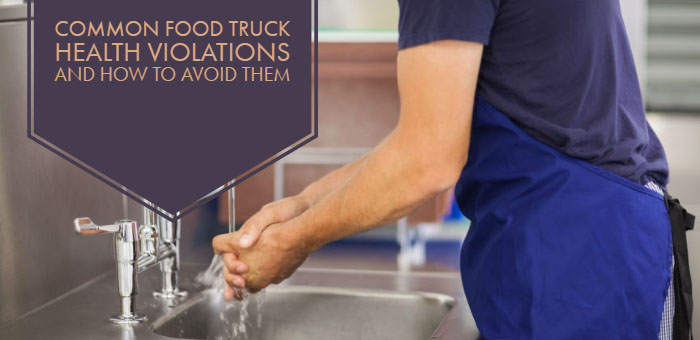To food truck owners, local health department inspections may seem like a nuisance. Getting a report with multiple health violations can lead to unexpected costs for repairs, new equipment or other improvements. And with inspection results increasingly visible, the damage to your truck’s reputation and revenue can happen overnight.
Try to remember that health inspections are conducted with the best intention. Health inspections aim is to protect the public from foodborne illness. They do this by helping vendors understand how well they are doing to promote safe food handling, storage and preparation in their truck, and areas they need to improve.
Page Contents
- Common Food Truck Health Violations
- Infrequent or improper handwashing
- Temperature abuse of time/temperature control for safety (TCS) foods
- Failing to Display Health Inspection Grades
- Not Having a Certified Food Handler on Staff
- Improper storage or use of chemicals
- Poor cleaning and sanitizing
- Cross-Contamination
- Poor pest control
- Pest Prevention Strategies
- The Bottom Line
Common Food Truck Health Violations
Infrequent or improper handwashing
Handwashing is one of the most critical components for preventing foodborne illness. Employees should wash their hands after completing tasks that could have contaminated their hands, such as taking out the garbage and handling money. This also includes if they touch their face or hair. In addition, handwashing should be done before putting on a new pair of gloves.
Make sure your truck’s water supply is continuously monitored and keep it from running dry. This will prevent staffers from adequately washing produce, food-encrusted utensils, or their dirty hands.
Are your sinks accessible and stocked with hand cleaner and drying options? Is handwashing signage posted? Reduce the chance of this infraction by providing handwashing sinks that are clean, well-stocked, easy to access and free of clutter.
Prevention: Ensure your truck has an adequate water supply system that meets local health department requirements. Check it daily to make sure it’s functioning right.
Temperature abuse of time/temperature control for safety (TCS) foods
Violation: TCS foods require either time or temperature control in order to limit the amount of pathogens on the food. If foods are allowed to be in the temperature danger zone (40F to 140F) for too long, then pathogens can grow to harmful levels and can cause foodborne illness.
Prevention: To prevent this from happening, keep hot-held foods hot (above 140F) and cold-held foods cold (below 40F). When thawing foods, be sure to use approved methods, such as in the refrigerator or under cool running water. When cooling foods using the two-stage cooling process, use the correct time and temperature controls to ensure the food is safe.
Failing to Display Health Inspection Grades
Violation: Not showing your latest health inspection grade if it’s required by law.
Prevention: Always display your health inspection grade prominently. It shows customers you’re serious about keeping things clean and safe. This is an easy violation to prevent. Just make sure the inspection grade is displayed prominently so diners can see how you scored.
Not Having a Certified Food Handler on Staff
Violation: Many places require at least one person on the truck to have a food handler’s certificate.
Prevention: Get yourself or a staff member certified. It’s usually just a short course, and it’ll teach you a lot about keeping things safe and clean.
Improper storage or use of chemicals
Violation: Keep your chemicals stored properly to help avoid health violations. If chemicals get into food, it can be very harmful to the consumer.
Prevention: Make sure that they are used and stored away from food and food-contact surfaces, this is the best way to prevent chemicals from getting into food. In addition, it is important to clearly label all chemicals so they are not confused for other chemicals or even food items.
Poor cleaning and sanitizing
Cleaning and sanitizing utensils, equipment, and machines routinely is critical in preventing foodborne illness. Clean utensils, such as cutting boards and knives, at least once every four hours if in constant use. Also, clean and sanitize utensils between tasks, such as cutting raw chicken and then slicing raw vegetables.
Employees should regularly clean and sanitize machines, such as ice and fountain drink dispensers, as directed in the manufacturer’s instructions to prevent pathogen growth. Steer clear of a violation by paying close attention to these areas, being alert to potential soil buildup and cleaning the surfaces effectively with products formulated for each type of surface.
Cross-Contamination
Violation: Raw meats mingling with your veggies? That’s a no-go. It’s a surefire way to spread bacteria.
Prevention: Use separate cutting boards and utensils for different types of food. Make it a rule: one for meats, another for veggies, and keep them apart like they’re in a food feud.
Poor pest control
Pests like rodents, cockroaches, and flies are attracted to food and waste. Once they make themselves at home in your food truck, they can contaminate your food supplies with pathogens that cause diseases such as salmonella and E. coli. Beyond health risks, a pest sighting can seriously damage your reputation. Word spreads fast, and no one lines up for a side of pests with their meal.
Pest Prevention Strategies
1. Immaculate Cleanliness:
- Why It Matters: Pests are attracted to food and water. By eliminating these attractions, you significantly reduce the risk of infestation.
- How to Implement: End each day with a thorough cleaning. Wipe down all surfaces, sweep and mop the floors, and make sure no food or water is left out overnight. This includes cleaning grills, stovetops, and prep areas to remove grease and food debris.
2. Seal Points of Entry:
- Why It Matters: Pests can squeeze through surprisingly small gaps. Sealing these entry points cuts off their access.
- How to Implement: Regularly inspect your truck for cracks, holes, or gaps, especially around doors, windows, and where utilities (like gas and water lines) enter. Use silicone caulk, steel wool, or proper sealing materials to close these gaps.
3. Proper Waste Management:
- Why It Matters: Garbage is a major draw for pests. Efficient waste management keeps them at bay.
- How to Implement: Use garbage cans with tight-fitting lids and empty them regularly. Keep the area around your truck free from debris and spilled food. Store waste and recyclables away from the truck’s main area.
4. Food Storage:
- Why It Matters: Improperly stored food is an open invitation to pests.
- How to Implement: Store dry goods in sealed containers off the floor. Keep refrigerated items in clean, sealed spaces. Regularly check for signs of pests near your storage areas.
The Bottom Line
Correcting these problem areas can help keep you, your employees, and your customers safe. Take steps to avoid the most frequent health violations and translate specific findings from your report into improvements. Do this to be well prepared for your next inspection. More important, your food truck will be a safer and healthier for consumers and better for business.
How does your food truck measure up on these frequently cited health violations? Conducting an honest evaluation is a good step toward earning great inspection reports. But don’t stop there. Learn from your inspections, paying special attention to repeated violations and correcting all trouble spots as soon as possible. Most health department have resources that can help.




